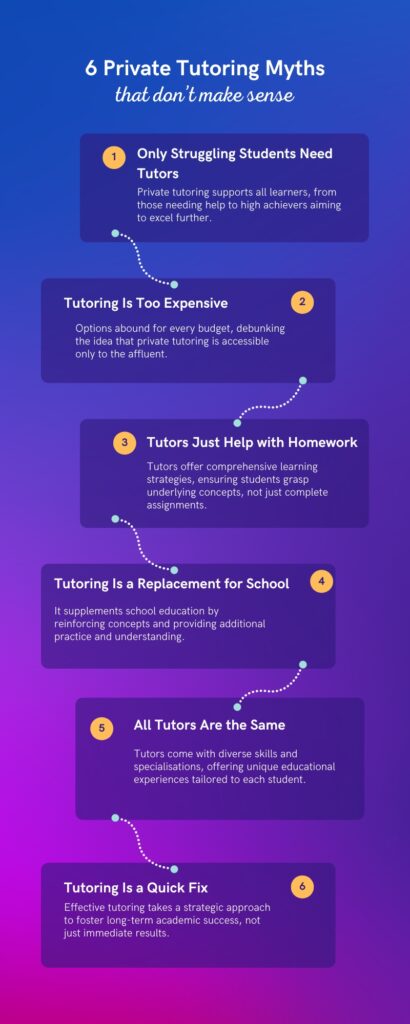Top 6 Myths about Private Tutoring
Are you exploring private tuition for your child and finding yourself bamboozled by half-truths and misconceptions? Whether you’re navigating the tutoring waters for the first time or considering a fresh approach, it’s easy to get entangled in the labyrinth of myths surrounding private tutoring. We’re here to guide you through this maze, separating fact from fiction, and setting the record straight on some persistent tutoring myths.
In this enlightening article, we debunk common misconceptions, from the notion that ‘tutoring is merely for those falling behind’ to the idea that ‘only wealthy families can afford it’. Along the way, we’ll shine a light on the myriad ways private tutoring can support your child’s educational journey, and how it can be a powerful ally regardless of your child’s current academic standing.
Join us as we demystify the world of private tutoring, enabling you to make a well-informed decision that best serves your child’s unique learning needs.

Myth 1: Tutoring is Only for Students Who Are Falling Behind
This pervasive myth is perhaps the most common misunderstanding about private tutoring. Many parents are under the impression that tutoring is exclusively a lifeline for students who are struggling or falling behind in their academic endeavours. However, the reality is quite different.
Private tutoring isn’t simply a remedial tool. It’s a powerful resource for learners at every stage and every level of aptitude. True, it can provide a crucial boost for students who are finding certain subjects or concepts difficult, helping them to catch up. But it also offers a wealth of benefits for students across the entire academic spectrum.
For those students already performing well, tutoring can provide an extra challenge, introducing more advanced concepts and deepening their understanding. This can be particularly useful for high-achieving students who may not feel sufficiently stretched by their school curriculum.
Tutoring can also support students who are doing well overall, but may have one specific area of weakness. A private tutor can provide targeted help in these situations, reinforcing learning and improving confidence.
Even for those students who are simply average performers, tutoring can help in enhancing their understanding, refining their skills, and ultimately, improving their performance. It’s about building confidence, nurturing a love for learning, and providing a personalised educational experience tailored to the student’s individual needs and goals.
So, to debunk this myth – no, tutoring is not just for students who are falling behind. It is a versatile educational tool designed to support and enhance learning for all students, regardless of where they are on their academic journey.
Myth 2: Tutoring is Only for Wealthy Families
This is another myth that could potentially dissuade families from considering private tutoring. It’s easy to fall into the trap of believing that tutoring is an exclusive service, reserved only for those with a hefty bank balance. Yet, this perception couldn’t be further from the truth.
It’s undeniable that private tutoring does come at a cost, but its affordability has vastly improved over recent years, especially with the rise of online platforms and a more competitive market. With a broader range of tutors available – each with different levels of experience, qualifications, and rates – there’s a tutor to suit almost every budget.
Furthermore, many tutoring platforms and independent tutors offer tiered pricing, flexible packages, or even discounted rates for long-term commitments. This allows families to select the right tutor based on their financial circumstances without compromising on the quality of tuition.
Another cost-effective option is group tutoring, where a few students come together for shared sessions. This not only makes tutoring more affordable but also provides opportunities for students to learn from their peers’ questions and perspectives.
Additionally, some tutoring services and educational charities even offer free or subsidised tutoring to students from low-income families or those who qualify for additional educational support. There are also a number of online resources and platforms offering inexpensive or free tutoring in various subjects.
In essence, private tutoring is no longer an educational luxury limited to the wealthy few. With the diverse range of options now accessible, quality private tutoring is becoming a viable educational support tool for families of all income levels.
Myth 3: Tutors Do Homework for Students
It’s not uncommon for parents to harbour the misconception that hiring a tutor essentially means outsourcing their child’s homework. But that notion is far from accurate.
A quality tutor’s role is not to do the homework for their students, but rather to guide them in understanding concepts, improving study techniques, and developing problem-solving skills. The idea is to help students become independent learners who can tackle their homework and other academic tasks by themselves over time.
A responsible tutor will assist students in dissecting complex homework tasks, breaking them down into manageable chunks, and developing a step-by-step approach to tackle them. They may provide examples or guide students through similar problems, but ultimately, the work should be completed by the student.
The primary purpose of homework is to reinforce what was taught in school and to help students grasp and apply the concepts. If a tutor were to complete the homework for a student, it would defeat this purpose and potentially hinder the student’s progress in the long term.
Moreover, tutors often use homework as a tool to gauge a student’s understanding, identify gaps in their knowledge, and tailor future lessons accordingly. So, while a tutor’s role does involve homework, it is not about doing the work for students, but about supporting them in their learning journey to become self-reliant and confident learners.
Myth 4: Tutoring Replaces School Learning

The notion that tutoring serves as a complete replacement for traditional school learning is another common myth. However, the reality is quite different.
Tutoring is designed to supplement and enhance the learning that takes place in school, not replace it. Tutors work with the information and skills students acquire in their classrooms and build upon them to deepen understanding and increase mastery. They provide a personalised learning experience, addressing individual strengths and weaknesses that a classroom setting might not be able to cater to.
It’s important to remember that schools provide a comprehensive educational structure. They offer a broad curriculum, a social learning environment, and opportunities to develop a variety of skills through different subjects and extra-curricular activities.
Tutoring, on the other hand, offers a targeted approach to help students navigate through academic challenges, build confidence, and improve in specific areas. While a tutor can provide valuable support in strengthening academic skills, they also reinforce the lessons learned in school, helping students to better understand and retain classroom teachings.
So, the role of a tutor should be seen as a complement to school learning, not a substitute. Together, school learning and private tutoring provide a balanced educational experience that supports the overall academic growth and success of the student.
Myth 5: All Tutors are the Same
One of the most misconceived notions about tutoring is that all tutors are identical, offering the same experience, teaching style, and level of expertise. In truth, tutors, like teachers and students, are diverse and unique.
First and foremost, the level of knowledge and expertise varies greatly among tutors. Some may be trained and certified teachers with years of classroom experience, while others might be university students who excel in a particular subject. It’s also important to note that tutors specialise in different areas, from GCSE maths to A-level English, from exam preparation to special educational needs.
Furthermore, tutors have their unique teaching methods. Some adopt a more structured approach, closely following the national curriculum, while others may use more innovative and interactive teaching methods to engage students. The best tutors are those who adapt their teaching styles to meet the individual learning styles and needs of their students.
The rapport that a tutor builds with a student also plays a vital role in the learning process. Tutors with a warm, approachable personality can often connect better with students, making learning more enjoyable and less stressful.
Given this diversity, it’s crucial for parents to find the right fit when seeking a tutor for their child. Fortunately, platforms like Edumentors offer a wide range of tutors, allowing you to find one that matches your child’s academic needs, learning style, and personality. Remember, the right tutor can make a significant difference in your child’s academic journey.
Myth 6: Tutoring is a Quick Fix
Another pervasive myth is that tutoring serves as a quick solution to academic difficulties. Some parents might hope to see dramatic improvements in their child’s grades after a few tutoring sessions, believing it to be some form of academic magic wand. However, tutoring, like any learning process, takes time and patience.
Tutoring is not a miracle cure for learning struggles. It’s an educational strategy designed to provide personalised assistance, reinforce understanding, and build confidence. It aims to bridge the gaps in a child’s knowledge, which can’t typically be addressed overnight. The true value of tutoring lies in its ability to provide ongoing academic support, helping students to comprehend complex concepts, improve skills, and ultimately perform better in school.
While some students may experience noticeable improvements early on, for most, progress is gradual. It’s important to remember that effective learning is a process and improvement is often incremental. Each student is different, so the timeline for progress will vary. Patience, consistency, and reinforcement are key factors in tutoring success.
In many cases, the benefits of tutoring extend beyond just academic improvement. Regular tutoring can also foster a love for learning, boost self-confidence, improve study habits, and equip students with critical thinking and problem-solving skills that will serve them well in their future endeavours.
Therefore, rather than seeing tutoring as a quick fix, it’s more helpful to view it as a long-term investment in your child’s educational journey. It’s about equipping them with the tools they need to excel not just in their current studies, but in the learning challenges they will encounter in the future. It’s a partnership between the tutor, student, and parent, aimed at fostering a supportive learning environment where the student can thrive.
Conclusion
In a rapidly evolving educational landscape, tutoring continues to emerge as a dynamic and robust approach to augmenting a child’s academic journey. But as we’ve revealed in debunking these six myths, tutoring is so much more than just ‘extra lessons.’ It’s an invaluable tool that empowers learners to reach their full potential, offering personalised assistance and creating an environment conducive to growth and understanding.
We must shift our perception of tutoring from a remedial measure to a proactive tool for growth, empowerment, and educational success. Whether your child is striving to catch up, yearning to be challenged, or anywhere in between, tutoring can open doors and transform their educational experience.
At Edumentors, they champion this philosophy. With a vast network of highly qualified tutors—each one a student from a top UK university—Edumentors is at the vanguard of debunking these persistent myths. These tutors are committed to fostering an engaging and inspiring learning environment, bolstering self-confidence, and guiding each student towards their unique academic goals.
The key to successful tutoring is to understand its potential as a long-term investment in your child’s education. By pairing your child with a tutor that complements their learning style and understands their academic goals, you can harness the true power of tutoring.









